1. Introduction to the Recipe
Few things beat the flavor and texture of freshly made flour tortillas. Soft, pliable, slightly chewy, and warm off the skillet, they’re a must for everything from tacos and burritos to quesadillas and wraps. This easy flour tortillas recipe uses just four basic ingredients: flour, salt, fat, and water—plus a bit of oil for cooking—and yields better-than-store-bought results with minimal effort.
What makes these tortillas stand out is their simplicity and versatility. You can use vegetable shortening for a neutral flavor, unsalted butter for richness, or pork lard for a more traditional and savory finish. With only a bowl, rolling pin, and skillet required, you don’t need special equipment to make them at home. Once you try these, you’ll never go back to store-bought tortillas that often contain preservatives and artificial softeners.
Homemade tortillas are also a perfect base for numerous recipes. Pair them with dishes like homemade chicken fajitas or carne asada for a complete meal. The dough can even be made ahead, making these a great addition to your meal prep routine.
In this article, you’ll find the complete ingredient list and step-by-step method, advanced techniques for rolling and cooking perfect tortillas, tips for storing and reheating, dietary swaps, common troubleshooting advice, and some final reflections on why homemade tortillas are worth every minute.
2. Basic Recipe: Ingredients and Instructions
Print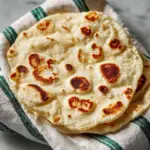
Homemade Flour Tortillas Recipe
Description
Soft, authentic flour tortillas recipe made from scratch with just 4 ingredients—perfect for tacos, burritos, and wraps.
Ingredients
- 3 cups all-purpose flour (plus more for dusting)
- 1 teaspoon kosher salt
- ½ cup fat (vegetable shortening, unsalted butter, or pork lard)
- 1 cup warm water
- Vegetable oil or cooking spray (for cooking)
Instructions
- Mix the dry ingredients
In a large mixing bowl, whisk together the flour and kosher salt until well combined. - Cut in the fat
Add the fat of your choice (shortening, butter, or lard). Use your fingers or a pastry cutter to work the fat into the flour until it resembles coarse crumbs. - Add warm water
Pour in the warm water a little at a time, mixing with a fork or your hands until a soft dough forms. Knead for 3–4 minutes until smooth and elastic. - Rest the dough
Cover the dough with a clean kitchen towel or plastic wrap and let it rest for 30 minutes at room temperature. This helps the gluten relax for easier rolling. - Divide and shape
Divide the dough into 10–12 equal pieces. Roll each into a ball and flatten slightly. - Roll out tortillas
On a lightly floured surface, use a rolling pin to roll each ball into a thin circle, about 7–8 inches in diameter. Dust with flour as needed to prevent sticking. - Cook tortillas
Heat a cast iron skillet or non-stick pan over medium-high heat. Lightly grease with vegetable oil or cooking spray. Cook each tortilla for about 30–45 seconds per side, or until bubbles form and golden brown spots appear. - Keep warm
Stack cooked tortillas in a clean kitchen towel to keep them warm and soft until ready to serve.
Notes
Don’t skip the resting time—it makes rolling much easier.
Keep your pan hot but not smoking. Adjust heat between batches if needed.
If tortillas puff while cooking, that’s a great sign of well-made dough.
Keywords: Flour Tortillas
3. Advanced Techniques
Choosing the Right Fat for Texture and Flavor
Each fat adds a unique quality to the dough. Vegetable shortening yields a neutral, ultra-soft texture; unsalted butter adds flavor and a slightly richer bite; pork lard is traditional and gives a savory, flaky result. If using butter, make sure it’s softened, not melted. For lard, choose leaf lard (not hydrogenated) for best results. Experiment to find your favorite—it’s a personal taste decision.
Achieving Perfectly Round Tortillas
Rolling perfectly round tortillas can be tricky. Start by forming even dough balls. Flatten each before rolling and rotate frequently as you roll to maintain the circular shape. A silicone mat with measurements can help. Don’t worry if they’re not perfect—the rustic shape adds charm and authenticity.
Preventing Tough or Dry Tortillas
If tortillas turn out tough, it’s usually from over-kneading or overcooking. Keep the skillet hot but not scorching, and only cook each side briefly. Over-kneading develops too much gluten, making them chewy. A 3–4 minute knead is plenty. Also, be sure not to roll too thin if you prefer a softer bite.
Letting the Dough Rest to Improve Elasticity
Resting allows gluten strands to relax, making it easier to roll out the dough without it springing back. You can let the dough rest for up to an hour covered in a warm kitchen. If storing overnight, refrigerate and let it come back to room temperature before rolling.
How to Get the Signature Puff During Cooking
That puff is a sign of perfectly hydrated, well-kneaded dough. It comes from steam separating the layers. For best results, roll the dough evenly (not too thin), preheat your skillet properly, and flip only once. Pressing gently with a spatula during cooking can encourage puffing if needed.
See more advanced recipes at cookingwhite.com
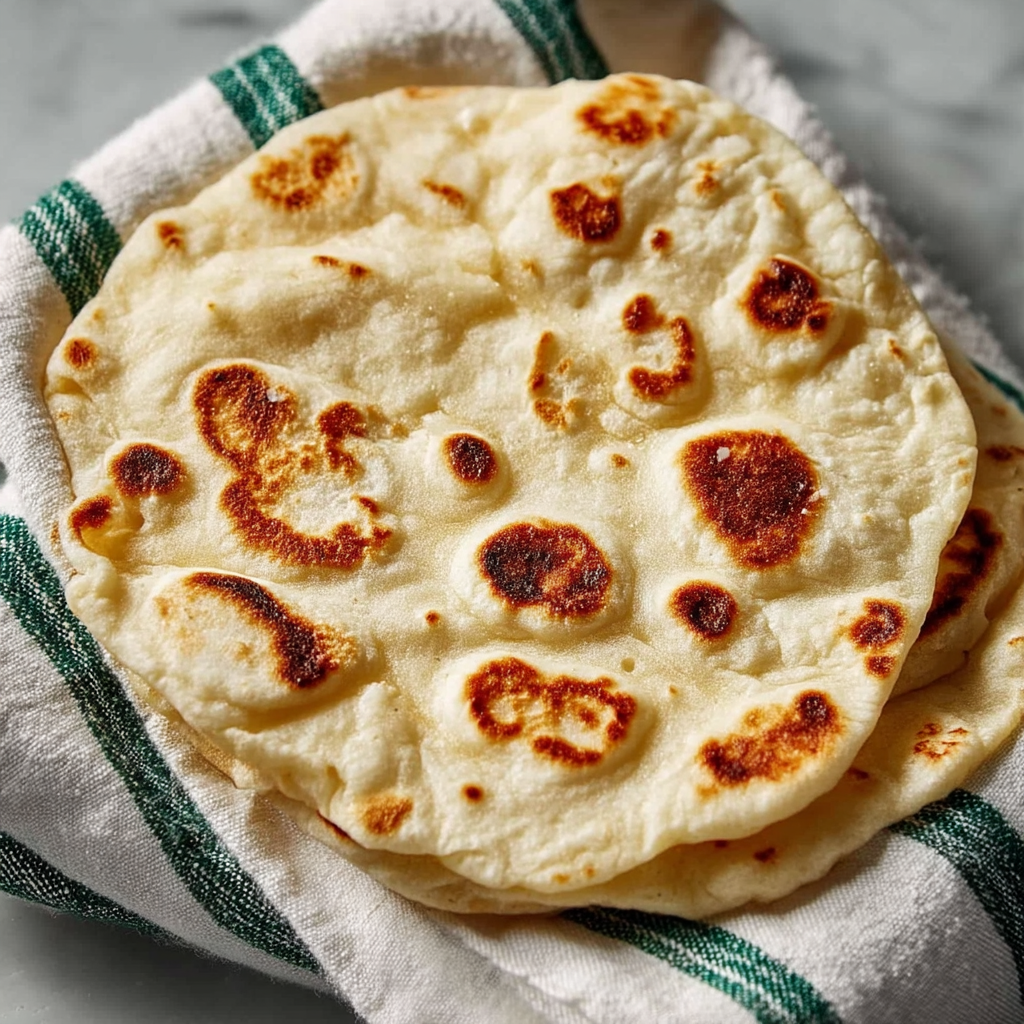
4. Storage, Shelf Life, and Maintenance Tips
Storing Cooked Tortillas at Room Temperature
Once tortillas are completely cooled, store in an airtight container or zip-top bag. Keep them at room temperature for up to 2 days. Wrap in a clean cloth or paper towels to absorb moisture and prevent sogginess.
Refrigerating and Reheating
Refrigerate tortillas in a sealed bag for up to 1 week. Reheat them on a dry skillet over medium heat for about 30 seconds per side, or wrap in a damp paper towel and microwave for 15–20 seconds.
Freezing Tortillas for Later Use
You can freeze tortillas with parchment between layers to prevent sticking. Store in freezer-safe bags for up to 3 months. Thaw at room temperature or in the fridge overnight, then reheat in a skillet or microwave.
Keeping Tortillas Soft After Cooking
Stack tortillas and wrap in a clean towel or foil as they come off the skillet to trap steam and maintain softness. Don’t leave them uncovered too long, or they’ll become dry and brittle.
Restoring Dry Tortillas
If tortillas dry out, sprinkle with a few drops of water, then reheat in a covered skillet or wrapped in foil in a warm oven. You can also steam them briefly or microwave them wrapped in a damp towel.
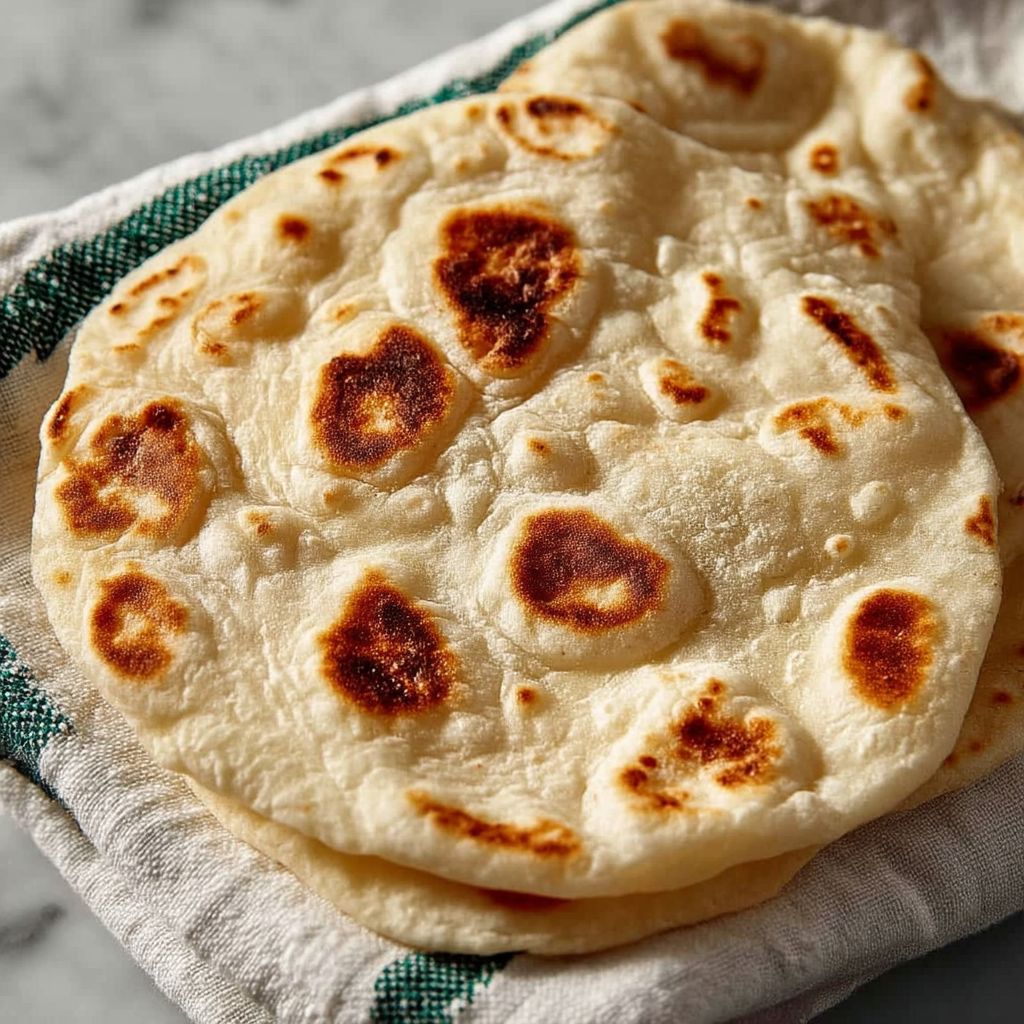
5. Dietary Adaptations and Substitutions
Whole Wheat Flour Tortillas
Substitute half or all of the all-purpose flour with whole wheat flour for added fiber and a nuttier flavor. You may need to add a little extra water, as whole wheat absorbs more liquid. Letting the dough rest longer helps reduce toughness.
Dairy-Free and Vegan Tortillas
Use vegetable shortening or plant-based margarine instead of butter to make this recipe fully vegan. Lard is technically dairy-free, but not vegan. Ensure your skillet is oiled with a plant-based spray.
Gluten-Free Version
For gluten-free tortillas, use a gluten-free flour blend with xanthan gum. The texture will be different—more like flatbread—but still tasty. Some recipes recommend adding a tablespoon of psyllium husk to help elasticity. Don’t expect puffing, but you’ll still get soft results.
Low-Sodium Tortillas
Reduce salt to ¼ teaspoon or omit it entirely if on a low-sodium diet. You may notice a slight difference in taste, but the tortillas will still perform well as wraps or taco shells.
Flavored Tortillas
Add dried herbs (oregano, thyme), spices (paprika, cumin), or mix-ins (minced spinach, jalapeño) into the flour before adding water. This gives your tortillas extra flair and makes them ideal for specific dishes like herbed chicken wraps or spiced veggie tacos.
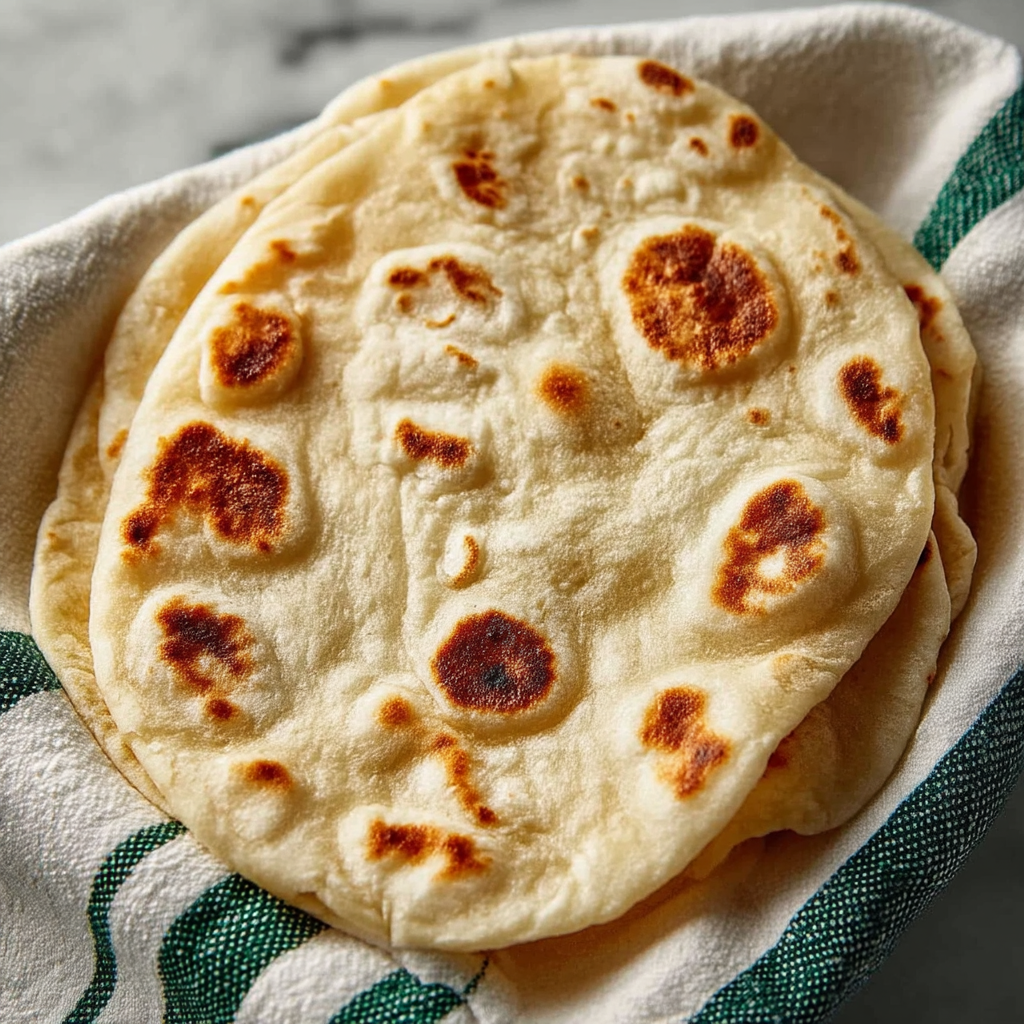
6. FAQs About the Recipe
Why are my tortillas stiff or cracking when folded?
They may be overcooked or too dry. Keep an eye on skillet temperature and cook just long enough to get light brown spots. Also, make sure to cover them immediately after cooking to trap steam and maintain softness.
Can I make the dough ahead of time?
Yes! Wrap the dough tightly and refrigerate for up to 48 hours. Let it come to room temperature before rolling. You can also freeze the dough in balls for up to 1 month—thaw in the fridge and let it warm up before rolling.
What if my tortillas don’t puff up while cooking?
Puffing is a sign of steam trapped between dough layers. If yours don’t puff, make sure the dough isn’t too thin, the pan is hot enough, and flip only once during cooking. Lack of puffing doesn’t affect taste but may indicate slightly uneven rolling.
Can I substitute water with milk?
You can use milk or a milk alternative instead of water for a richer, softer tortilla. It will slightly change the flavor and texture but can be delicious. Use the same quantity and warm it before mixing.
How do I reheat tortillas without drying them out?
Reheat in a warm skillet for 20–30 seconds each side, or wrap in a damp paper towel and microwave for 15–20 seconds. Covering tortillas while warming traps steam and keeps them soft.
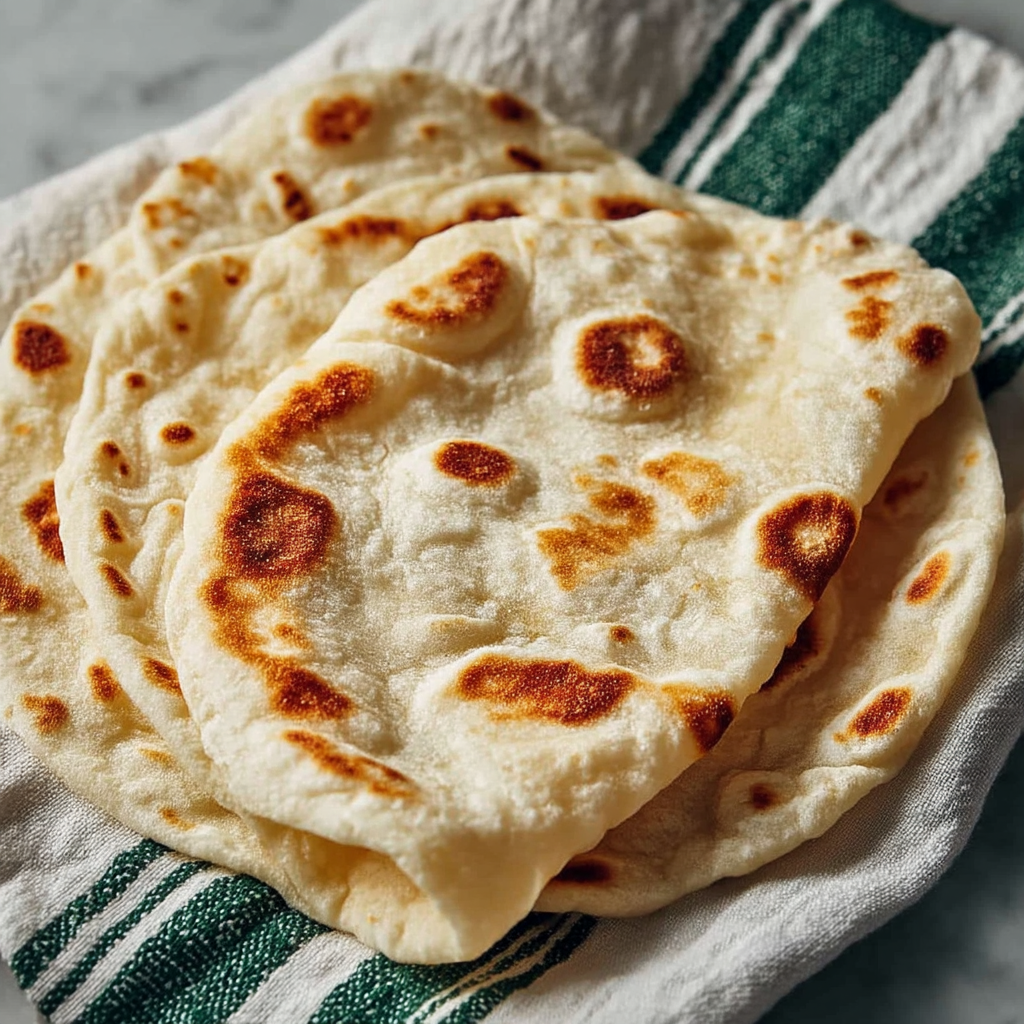
7. Conclusion & Final Thoughts
Making homemade flour tortillas is a simple yet rewarding kitchen project that elevates any Mexican-inspired meal. The softness, fresh flavor, and ability to customize your tortillas—from the choice of fat to added herbs—set this recipe apart from store-bought alternatives. Plus, it requires minimal ingredients and equipment, making it accessible to cooks of all levels.
Whether you’re rolling these for tacos, burritos, quesadillas, or simply enjoying them warm with butter, these tortillas add an authentic, comforting touch to your table. Their versatility means you can adapt the recipe easily to suit dietary preferences or experiment with flavors and textures.
Taking the time to master this flour tortillas recipe also connects you to a tradition of fresh, homemade cooking that’s better for your taste buds and often healthier, as you control every ingredient. The joy of tearing into a warm, soft tortilla is unmatched—and once you make them, you’ll see why this humble bread is beloved worldwide.
So grab your rolling pin, dust off your skillet, and enjoy the delicious journey of making your own homemade flour tortillas. Perfect for family dinners, gatherings, or just a tasty snack, they’re sure to become a kitchen staple you return to again and again.
